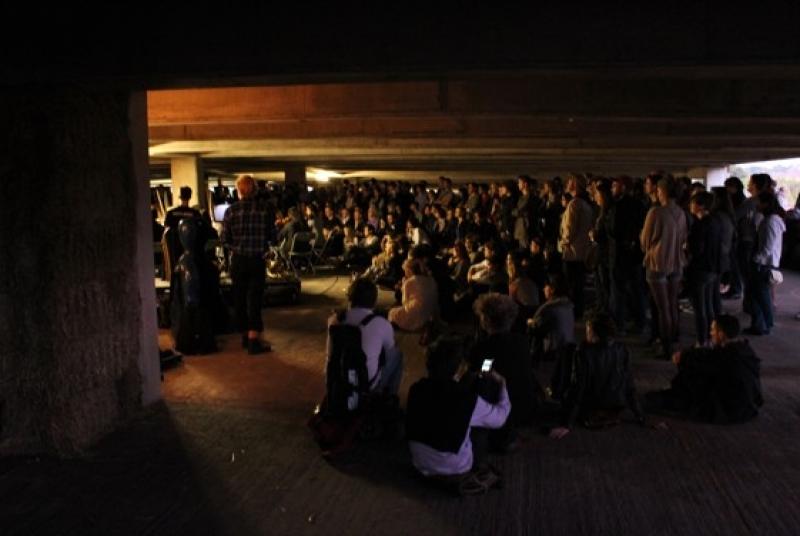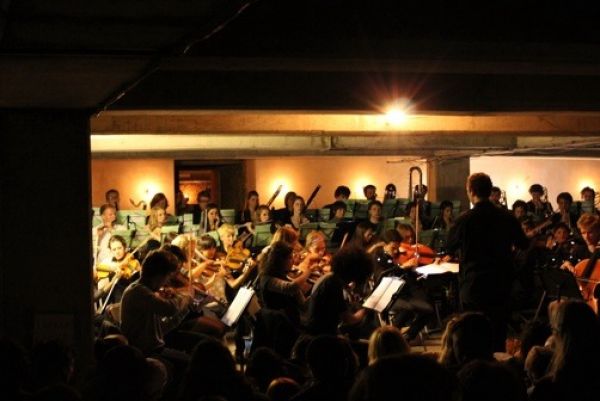The Rite of Spring, Peckham Car Park/ Yellow Lounge, London Bridge Arches | reviews, news & interviews
The Rite of Spring, Peckham Car Park/ Yellow Lounge, London Bridge Arches
The Rite of Spring, Peckham Car Park/ Yellow Lounge, London Bridge Arches
Two stunning offsite concerts challenge the pre-eminence of the concert hall

Forget almost everything you thought you knew about classical music. Forget the regulations and the rigmarole, the politeness and the prissiness. Forget the preening institutions. Forget the vocal doom-sayers. Classical music is in the throes of an extremely welcome revolution. The entrepreneurial spirit that seized and transformed British art in the 1980s is finally animating and unshackling this most stubborn of art forms.
Ironic jumpers stood in for white tie, red stripe for interval ice creams. Thundery passing trains deputised for tannoy notices. And a mass of young hairy creative types stood, sat, crouched, knelt, drank and huddled in front of a twitchy young scratch orchestra and the London skyline beyond. It was the latest and most sophisticated multi-channelled collaboration to hit London, with gallerist Hannah Barry teaming up with composer-impresarios Gabriel Prokofiev and Kate Whitley of Cambridge University.
But before the quality music-making could began, there was some real-life drama to attend to. A missing principal bassoonist. The hide-and-seek act almost upstaged her solo. Conductor Chris Stark picked up where the pre-concert tensions left off: driving rhythms, pushing dynamics, pinching pitches. Edgy stuff. The sort of fresh, confident, to-the-wire playing that you might have expected at the Parisian first night. There was mess. But good mess. Stark navigated the hairpin bends better than many professionals. But he didn't insist on an obscuring polish.
 Myung-Whun Chung might have pushed all the necessary analytical buttons in his recent performance of The Rite with the Orchestre Philharmonique de Radio France at the Proms. And it may have resulted in a ravishingly refined sound (though even in the beauty stakes Peckham outplayed the Proms by offering a gobstopper of a view). But the unforgettable Rites need balls. If at the end you didn't feel like you'd been assaulted, you'd be complacent not asking for your money back.
Myung-Whun Chung might have pushed all the necessary analytical buttons in his recent performance of The Rite with the Orchestre Philharmonique de Radio France at the Proms. And it may have resulted in a ravishingly refined sound (though even in the beauty stakes Peckham outplayed the Proms by offering a gobstopper of a view). But the unforgettable Rites need balls. If at the end you didn't feel like you'd been assaulted, you'd be complacent not asking for your money back.
Interestingly, Stark focused on momentum and clarity, the orchestra providing most of the energy without prompt (pictured right). There was no need for the podium to chivvy this enthusiastic swarm of ad hoc students (and smattering of pros).
It was instructive. Questions that have floated about unanswered for decades were blown clean away by this battery of music. Where is classical music's next generation of listeners? There they were, before us, a thousand of them. More flocked down from the rooftop restaurant and bar as the music wafted up over the concrete balconies. The question of qualitative compromise was ever present. In all this desperate bowing and scraping to the young, wouldn't something have to give? Not that I could see. Not musically. Not acoustically. The lower instruments rumbled out over London as if only now under the low concrete ceiling were they finding their true voice.
This was the week's second blow to 19th-century concert-going. On Wednesday, Decca decamped two of their brightest (and best-looking) stars - Danielle de Niese and Miloš Karadaglić - to the clubland arches of London Bridge station. Restricted to de Niese's current Baroque repertoire (with the Arcangelo Ensemble accompanying), it was never going to set the place on fire like the Rite did in Peckham, but it came close. Both Karadaglić and de Niese were naturals with this crowd and gave them two generous and uproariously received live sets.
Some complained about the queue for entry, the searches, the time it took to get a drink. For me these were benign signs of classical music's normalisation. Finally, a night of classical music would be as full of irritations as a normal gig. Some will have been driven mad by the lack of silence and the overhead rattle of trains. For me, these Cagean interventions from the real world were movingly appropriate, though I can't fully explain why.
And the presence of a living, breathing, responsive audience was never irksome. Quite the opposite. With listeners able to talk, to discuss, to amble, to drink, to shift themselves about at will, one could chart the ebb and flow of the performance from their decibel level. One could hear and feel the tension and concentration tightening and slackening. The conductor or singer could feel and hear when they had their audience in a vice and when they were beginning to lose them. Classical music can only gain from this sort of feedback.
Both evenings proved that there is no longer any excuse for 19th-century habits to continue. Those in charge can and must do much more than just tinker around the edges. Few concert halls in Britain have such superior acoustics that alternatives can be ignored. Philharmonic life now needs to be reimagined top to bottom. Let's hope Peckham's Rite was not just a sign of rejuvenation but also a proper death knell for the old ways.
- The Rite of Spring was part of Bold Tendencies at Peckham car park
- Find out more about Yellow Lounge
Share this article
Add comment
The future of Arts Journalism
You can stop theartsdesk.com closing!
We urgently need financing to survive. Our fundraising drive has thus far raised £49,000 but we need to reach £100,000 or we will be forced to close. Please contribute here: https://gofund.me/c3f6033d
And if you can forward this information to anyone who might assist, we’d be grateful.

Subscribe to theartsdesk.com
Thank you for continuing to read our work on theartsdesk.com. For unlimited access to every article in its entirety, including our archive of more than 15,000 pieces, we're asking for £5 per month or £40 per year. We feel it's a very good deal, and hope you do too.
To take a subscription now simply click here.
And if you're looking for that extra gift for a friend or family member, why not treat them to a theartsdesk.com gift subscription?
more Classical music
 Kempf, Brno Philharmonic, Davies, Bridgewater Hall, Manchester review - European tradition meets American jazz
Bouncing Czechs enjoy their Gershwin and Brubeck alongside Janáček and Dvořák
Kempf, Brno Philharmonic, Davies, Bridgewater Hall, Manchester review - European tradition meets American jazz
Bouncing Czechs enjoy their Gershwin and Brubeck alongside Janáček and Dvořák
 Solomon, OAE, Butt, QEH review - daft Biblical whitewashing with great choruses
Even a top soprano and mezzo can’t make this Handel paean wholly convincing
Solomon, OAE, Butt, QEH review - daft Biblical whitewashing with great choruses
Even a top soprano and mezzo can’t make this Handel paean wholly convincing
 Two-Piano Gala, Kings Place review - shining constellations
London Piano Festival curators and illustrious friends entertain and enlighten
Two-Piano Gala, Kings Place review - shining constellations
London Piano Festival curators and illustrious friends entertain and enlighten
 Echo Vocal Ensemble, Latto, Union Chapel review - eclectic choral programme garlanded with dance
Beautiful singing at the heart of an imaginative and stylistically varied concert
Echo Vocal Ensemble, Latto, Union Chapel review - eclectic choral programme garlanded with dance
Beautiful singing at the heart of an imaginative and stylistically varied concert
 Scott, Irish Baroque Orchestra, Whelan, RIAM, Dublin review - towards a Mozart masterpiece
Characteristic joy and enlightenment from this team, but a valveless horn brings problems
Scott, Irish Baroque Orchestra, Whelan, RIAM, Dublin review - towards a Mozart masterpiece
Characteristic joy and enlightenment from this team, but a valveless horn brings problems
 Classical CDs: Voice flutes, flugelhorns and froth
Baroque sonatas, English orchestral music and an emotionally-charged vocal recital
Classical CDs: Voice flutes, flugelhorns and froth
Baroque sonatas, English orchestral music and an emotionally-charged vocal recital
 Kanneh-Mason, Britten Sinfonia, Shave, Milton Court - a grin and a big beaming smile
A pair of striking contemporary pieces alongside two old favourites
Kanneh-Mason, Britten Sinfonia, Shave, Milton Court - a grin and a big beaming smile
A pair of striking contemporary pieces alongside two old favourites
 theartsdesk at the New Ross Piano Festival - Finghin Collins’ musical rainbow
From revelatory Bach played with astounding maturity by a 22 year old to four-hand jazz
theartsdesk at the New Ross Piano Festival - Finghin Collins’ musical rainbow
From revelatory Bach played with astounding maturity by a 22 year old to four-hand jazz
 First Person: Manchester Camerata's Head of Artistic Planning Clara Marshall Cawley on questioning the status quo
Five days of free events with all sorts of audiences around Manchester starts tomorrow
First Person: Manchester Camerata's Head of Artistic Planning Clara Marshall Cawley on questioning the status quo
Five days of free events with all sorts of audiences around Manchester starts tomorrow
 Goldscheider, Brother Tree Sound, Kings Place review - music of hope from a young composer
Unusual combination of horn, strings and electronics makes for some intriguing listening
Goldscheider, Brother Tree Sound, Kings Place review - music of hope from a young composer
Unusual combination of horn, strings and electronics makes for some intriguing listening

Comments
...
...
...